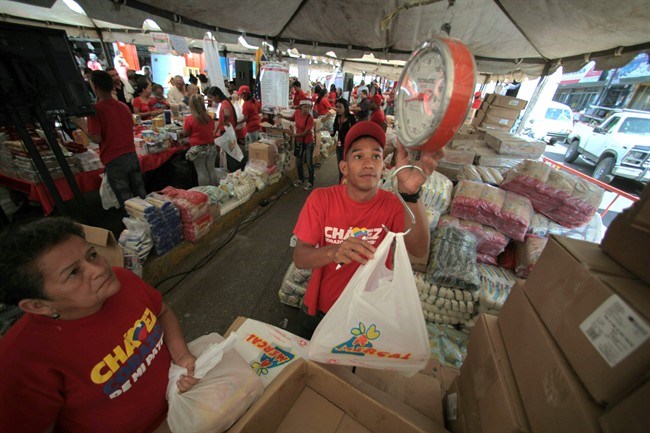CARACAS, Venezuela - Mireya Bustamante spent most of the day trying in vain to find flour to bake a birthday cake for her 4-year-old son.
Like most Venezuelans, the single, 33-year-old officer worker has periodically struggled with such food shortages for years, and, like many in the country, thinks they're getting worse. She blames price and currency controls imposed by the government, though authorities contend unscrupulous business owners are at fault.
"An odyssey that never seems to end" was how Bustamante described the everyday challenge of finding basic foodstuffs. "What good are the controls if it becomes so difficult to find basic products?" asked the mother of three. "It's the government's fault, not the owners of neighbourhood grocery stores."
Venezuelans have long had to shop around to find scarce foods, and lately consumers have had particular trouble finding staples like chicken, cooking oil, sugar and coffee, as well as toilet paper and some medicines. The shortages are a potential political vulnerability for the government while President Hugo Chavez lies bedridden in Cuba, unheard from more than a month after his fourth cancer operation.
Such economic questions about his socialist model are adding to the political uncertainty sparked by Chavez's illness and long absence. However, there have been no signs so far that the political crisis is aggravating the economic one.
Chavez's government has sold cheap, subsidized staples at state-run markets for years to reinforce support among the poor. It says price controls, established in 2003, are essential to protect the poor by countering inflation while government-established exchange rates for foreign currencies are needed to prevent capital flight. Those currencies, chiefly the U.S. dollar, are used to pay for Venezuelan oil.
Many economists say the shortages stem from mismanagement of the economy through the price and currency controls. Official accusations of hoarding and price speculation aim to deflect blame for failed economic policy, government critics argue.
"Since the presidential election in October the government has seriously restricted the amount of dollars it is assigning to the private sector. This has caused the parallel dollar to soar and is leading to shortages," said David Smilde, a University of Georgia sociologist and analyst for the U.S. think-tank the Washington Office on Latin America. Many analysts believe heavy government spending on social programs and giveaways ahead of Chavez's Oct. 7 re-election badly depleted the treasury.
The Chavez government has long been at loggerheads with private business leaders over state-set price controls and on Jan. 7 government inspectors began raiding warehouses. The government said Monday that it had recovered 3,088 metric tons of allegedly hoarded food this month.
Over the weekend, National Guard troops entered one market in downtown Caracas and confiscated 20 tons of beef, 15 tons of corn and 4 tons of garlic that allegedly violated price controls.
Food imports have swiftly risen in the nation with the world's largest oil reserves. Domestic production of some food products has declined while inflation has soared, reaching 20 per cent last year, the highest in Latin America.
Starting in 2007, Chavez also stepped up nationalizations of industries and expropriations of private property
Jorge Roig, who represents Venezuela's largest business chamber, called on the government Monday to free up more dollars, which could be used to buy more imported goods.
Roig said business leaders in October had warned the state agency responsible for trading U.S. dollars to businesses at the official exchange rate that shortages of food and other products would occur during the first quarter of 2013 if the government didn't release more hard currency.
"The market is undersupplied and it's showing on the shelves," he said.
A monthly scarcity index compiled by Venezuela's Central Bank, relying on spot checks in markets across the nation, reached its highest in four years last month. The index remains below a high hit in 2007, when widespread food shortages were considered a key factor in Chavez's defeat in a referendum on constitutional changes.
Pollster Luis Vicente Leon said the current shortages could again reach levels seen in 2007.
Asdrubal Oliveros of Econoanalitica, a Caracas-based economic think-tank, blames government economic policy.
"The controls don't work," Oliveros said. "In every part of the world they have demonstrated their failure."
Private companies that import food and other products receive dollars from the government every month or two months, but there have been delays recently. Roig said the government is often only delivering a small percentage of what companies request.
During visits to several shops and supermarkets in downtown Caracas, an Associated Press reporter noticed a lack of chicken, milk, cooking oil, beef, sugar and coffee. Also scarce was cornmeal, the main ingredient for the country's cherished "arepas," corn cakes that are stuffed with meat, chicken, cheese or other fillings.
More consumers are being forced to hop from market to market in different areas to fill their grocery lists.
Beatriz Romero, a 44-year-old housewife, looked exasperated as she emerged from a small grocery store in bustling downtown Caracas holding plastic bags full of canned goods and vegetables.
"I didn't find everything that I needed," said Romero, who wanted to buy rice, cornmeal and sugar. "I'll have to go look for the other products somewhere else."
___
Associated Press writer Ian James contributed to this report.
___
Vivian Sequera on Twitter: http://twitter.com/VivianSequera
___
Christopher Toothaker on Twitter: http://twitter.com/ctoothaker



